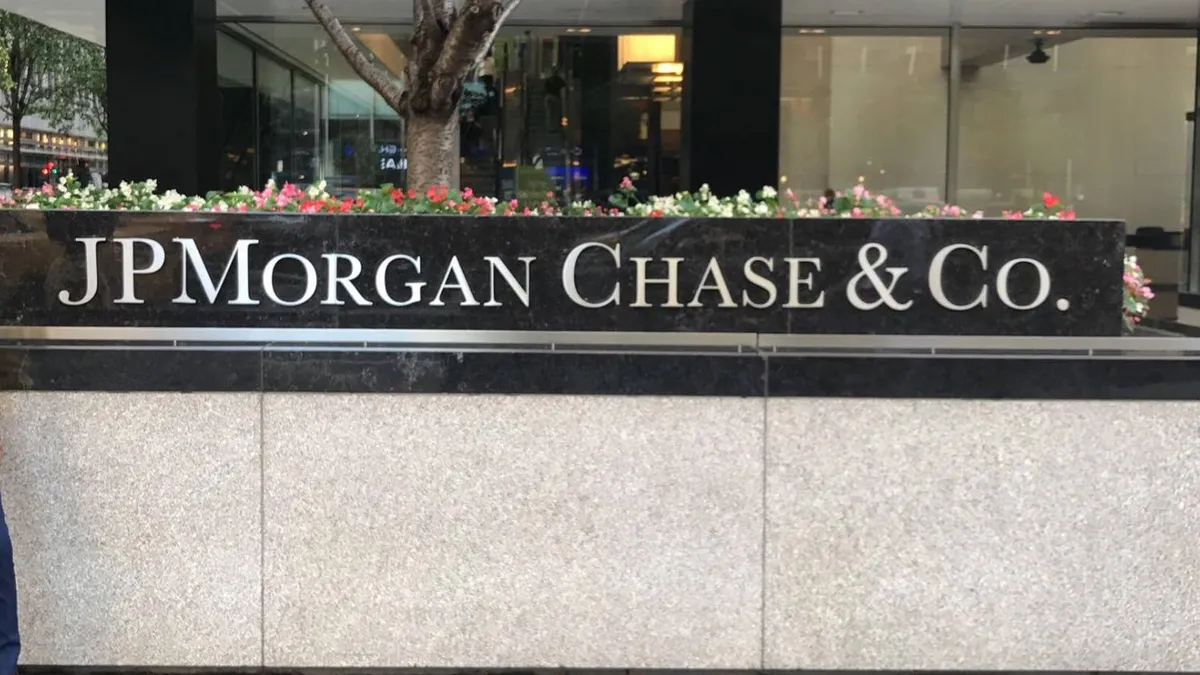UPDATE: Sept. 29, 2020: JPMorgan Chase admitted wrongdoing and will pay $920.2 million to settle allegations the bank manipulated the precious metals and Treasury markets over eight years, Bloomberg reported Tuesday. The case generated widespread speculation last week.
The penalty is the largest ever imposed by the Commodity Futures Trading Commission (CFTC) — a $436.4 million fine, $311.7 million in restitution and more than $172 million in disgorgement, the regulator said.
“Spoofing is illegal — pure and simple,” CFTC Chairman Heath P. Tarbert said in a statement Tuesday. “This record-setting enforcement action demonstrates the CFTC’s commitment to being tough on those who intentionally break our rules, no matter who they are.”
The Justice Department (DOJ) filed two counts of wire fraud against the bank’s parent company but agreed to a three-year deferred prosecution agreement that requires the bank to report its remediation and compliance efforts to the government, Bloomberg reported.
JPMorgan said it has spent more than $430 million recruiting hundreds of new compliance officers and increasing its internal audit budget after it was fined for manipulating currencies markets in 2015, according to the Financial Times.
Regulators and the DOJ faulted JPMorgan for failing to fully cooperate earlier in the investigations. The bank began suspending suspected traders on its metals desk only after a second person had pleaded guilty, the DOJ said, according to the Financial Times
In all, 15 traders at the bank caused losses of more than $300 million to other participants in precious metals and Treasury markets, court filings Tuesday said, according to Bloomberg.
Five former JPMorgan traders — none of whom have been charged publicly — executed thousands of deceptive trades, the government said, according to the wire service.
The deal ends a criminal investigation of the bank that has ensnared six employees, who are charged in the rigging of gold and silver futures prices. Two have pleaded guilty. Four are awaiting trial.
The dollar value of the penalty far outpaces similar judgments against banks for spoofing, a signal that regulators are cracking down on market manipulation.
“There aren’t that many cases in the white-collar world that would warrant total penalties in these amounts,” James McDonald, the CFTC's enforcement director, said, according to the Financial Times. The fine “reflects the scope and breadth of the conduct that’s at issue," he said. (Update: McDonald told The Wall Street Journal on Oct. 2 he would be resigning from the CFTC effective Oct. 9.)
JPMorgan also agreed to pay $35 million to settle related charges with the Securities and Exchange Commission, but the bank’s payment to the CFTC would offset that fine, Reuters reported.
Dive Brief:
- JPMorgan Chase is set to pay nearly $1 billion in a settlement to resolve investigations by the Justice Department (DOJ), Commodity Futures Trading Commission (CFTC) and Securities and Exchange Commission (SEC) into whether the bank’s traders manipulated precious metals and Treasury markets, Bloomberg, Reuters, the Financial Times and The Wall Street Journal reported, citing anonymous sources.
- The bank is expected to admit wrongdoing, but the settlement could allow JPMorgan Chase to avoid prosecution and suffer no restrictions on its business, the publications reported.
- The dollar figure in the settlement far exceeds previous penalties for spoofing. Scotiabank last month agreed to pay $127.4 million to resolve criminal charges related to alleged price manipulation in the precious metals markets and false statements made to the government. Deutsche Bank, UBS and HSBC agreed in 2018 to pay a combined $47 million to settle allegations of deceptive trading in precious metals.
Dive Insight:
In spoofing, traders typically submit, then cancel, a large number of orders to create the appearance of heavy supply or demand to shock the market or trick others into trading at a more desirable price. Lawmakers specifically prohibited the practice in 2010 as part of the Dodd-Frank Act.
The Justice Department (DOJ) in September 2019 charged the former head of JPMorgan’s metals trading unit, along with two other former traders, with racketeering and other counts for their alleged role in metals market manipulation over eight years. A fourth employee who worked with the bank’s hedge fund clients was also later charged. All four have pleaded not guilty.
However, two other former JPMorgan traders — Christian Trunz and John Edmonds — have pleaded guilty to placing thousand of false orders between 2007 and 2016. The DOJ has alleged that Trunz "learned to spoof from more senior traders, and spoofed with the knowledge and consent of his supervisors," the Financial Times reported.
JPMorgan said in its annual report in April that it was "engaged in discussions with various regulators" about allegations including "unjust enrichment and deceptive acts" in connection with the trading of precious metals and treasuries.
Spokespeople for the Justice Department, CFTC, SEC and JPMorgan all declined to comment to the publications.
This wouldn't mark the first time the nation's largest bank was punished for manipulating markets. JPMorgan paid the DOJ a $550 million fine in 2015 as part of a currency-rigging scheme that enmeshed six banks.
The DOJ has ramped up enforcement surrounding spoofing in recent years. The agency, around 2017, began using techniques it developed to spot health care fraud schemes to identify suspicious trading patterns, Reuters reported.











